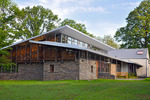 The Morris Arboretum has officially been awarded the Platinum Level LEED Certification, the highest rating of the U.S Green Building Council (USGBC), in honor of its new $13 million Horticulture Center located at Bloomfield Farm, marking a first for the University of Pennsylvania.
The Morris Arboretum has officially been awarded the Platinum Level LEED Certification, the highest rating of the U.S Green Building Council (USGBC), in honor of its new $13 million Horticulture Center located at Bloomfield Farm, marking a first for the University of Pennsylvania.
According to the Daily Pennsylvanian, the LEED (Leadership in Energy and Environmental Design) certification is “the nation’s most preeminent program for the design, construction and operation of high performance green buildings.”
Paul Meyer, the F. Otto Haas Director of the Morris Arboretum said, “I have been anticipating this day for nearly 30 years. We are very grateful to all the many contributors to the Always Growing Campaign that made this project possible.”
John and Lydia Morris first purchased the Bloomfield Farm property in 1913, providing fresh foods and dairy products for the community. Today, the farm serves as a site for testing new plant collections and is home to this innovative sustainable complex.
The Morris Arboretum of the University of Pennsylvania is located at 100 E. Northwestern Ave. in the Chestnut Hill section of Philadelphia.
The $13-million center was designated Platinum Level LEED for these sustainable energy and water management technologies:
- An efficient ground-source heat pump for heating and air conditioning, using only about one-forth the energy of a typical boiler/air conditioning system
- Photovoltaic panels for on-site generation of renewable energy, with peak electricity production during the hot summer months when demand for electrical power is highest
- Insulation to eliminate infiltration of outside air and reduce the energy lost through the walls
- Ventilation to maximize fresh air inside the building
- Solar hot water heaters to provide much of the building’s hot water
- Storm water collection in cisterns for use in toilets and landscape irrigation
- Skylights and roof monitors to supplement artificial lighting. Photocell sensors will automatically dim the electric lights in use on bright days to reduce energy use.
- Rain gardens and other collection systems to mitigate storm water run off
- Green roofs on garages to capture and absorb rain, slowing the surge of stormwater to the site drainage system. Green roofs also helps reduce ambient summer temperatures by providing a cool roof surface instead of the “heat island” associated with most asphalt or rubber roofs. The two green roofs on the garages are very visible examples of sustainability. The 4-bay garage has a four inch deep planting area with various types of sedum. The 6-bay garage roof is eight inches deep and was planted by hand with an experimental mix of plant species that are well adapted to seasonal hot and dry conditions.






